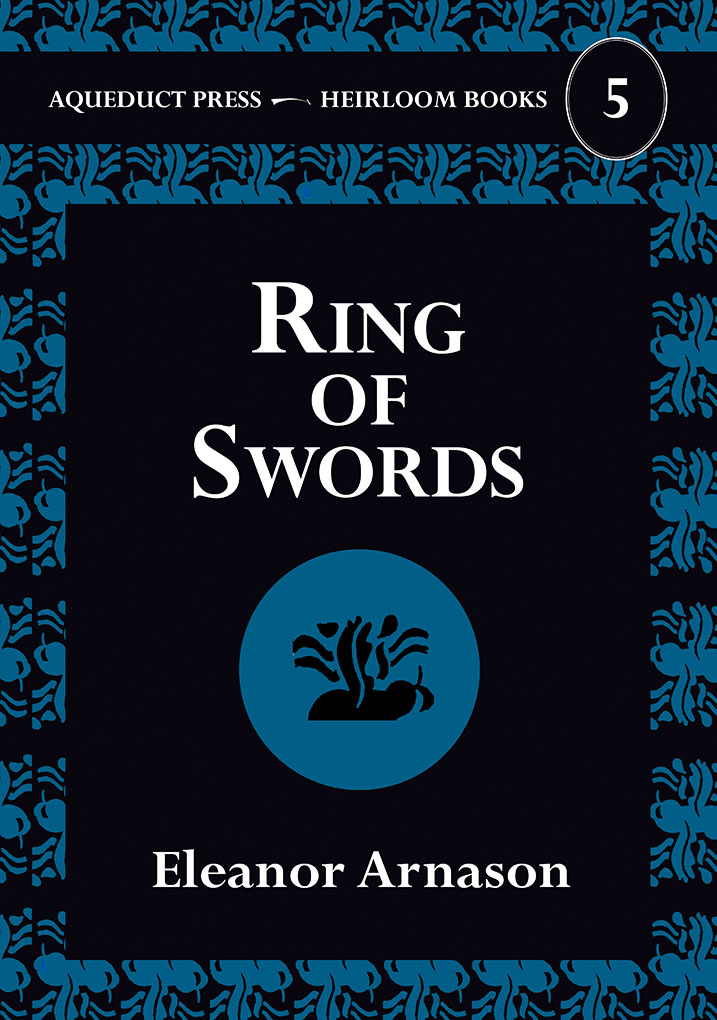Ring of Swordsby Eleanor Arnason
with and Introduction by Ursula K. Le GuinIn her introduction to this new edition of Eleanor Arnason's Ring of Swords, Ursula K. Le Guin writes, "Ring of Swords is an intellectually fascinating science-fiction story told in the novel tradition, peopled by ordinary people content with their ordinary life, appalled to find themselves swept up into a social crisis, forced into acts and choices of historical consequence. Its ancestry includes not only The War of the Worlds but also A Tale of Two Cities and War and Peace. "Having recently brought their own competitive, feud-ridden society into a fragile balance of peace, the Hwarhath have been facing an unexpected problem: the lack of enemies. Given the apparently innate male propensity for finding pretexts to fight, and the fact that their men were all trained as warriors, the women running things at home make sure the men stay out in space protecting the home planet. The drawback is that there seems to be nobody to protect it from. So, when in the vastness of space they finally stumble into another intelligent species, they rejoice. Enemies! At last!" "The usual assumption," Le Guin notes, "is that if you threaten a war early in a novel, you'd better hurry up and get the bombs bursting in air. And they usually do. Novels that portray war as totally destructive and futile still focus on it—war is what they're about, war is central to them, just as it was central to the old epics that glorified heroes and battles. But a war not fought? What kind of subject is that?" Le Guin asks. Her answer? "It's a beautiful subject for a novel, and Ring of Swords is a beautiful novel." Reviews
Tiptree Award-winner Arnason (A Woman of the Iron People) skillfully
blends anthropology and gender questions with intrigue and adventure
in this provocative tale of alien contact, a long-out-of-print 1993
feminist science fiction classic that's still strong and relevant 25
years on. Exobiologist Anna Perez just wants to study her
jellyfishlike creatures in peace, without the crowded distraction of a
bunch of diplomats preparing for the first nonviolent meeting between
humanity and the alien hwarhath. Then the hwarhath arrive with a
human: Nicholas Sanders, a civilian captured 20 years ago, who's now a
translator between the two races. A casual encounter with Nick puts
Anna in the crosshairs of human military intelligence, who want Nick
back. A failed kidnapping attempt ignites a tense showdown. To prevent
a bloodbath, the hwarhath demand the human military turn over Nick—and
Anna. With fascination overcoming trepidation, Anna agrees, setting
off on the exploratory mission of a lifetime. The tense plot, alive
with skillful worldbuilding and fascinating characters, is as
entertaining as it is fascinating. An introduction by Ursula K. Le
Guin reminds readers exactly why Arnason's novel remains important
today. (Starred review)
Eleanor Arnason's Ring of Swords is a novel full of insightful ideas
about gender, encountering foreign cultures, love, and loyalty. These
big ideas are anchored by a trio of fascinating characters. Ettin
Gwarha is an influential military leader of the Hwarhath, the first
starfaring race humanity has encountered. He seeks to negotiate a
peace with humanity, a task both aided and complicated by his
connection to his human lover Nicholas. Nicholas was a captive of the
Hwarhath, who has sided with his captives and even fallen in love with
one of them. And Anna, a scientist, is stuck in the middle when her
quiet research post becomes the site of the peace negotiations between
humans and Hwarhath, and she befriends Nicholas despite knowing his
status as a traitor to his species....This book reminded me strongly
of C.J. Cherryh's work--the same focus on character and societies and
their interaction, the same habit of moving the plot forward via
dialogue rather than through incident. It is an excellent example of
anthropological SF, and the forward by Ursula K. LeGuin is fitting. To
fans of LeGuin, Cherryh, or feminist SF more broadly I heartily
recommend this novel. To those who haven't tried any of the above,
this is an excellent place to start.
(Read the whole review)
ISBN: 978-1-61976-140-7 (13 digit)
|

